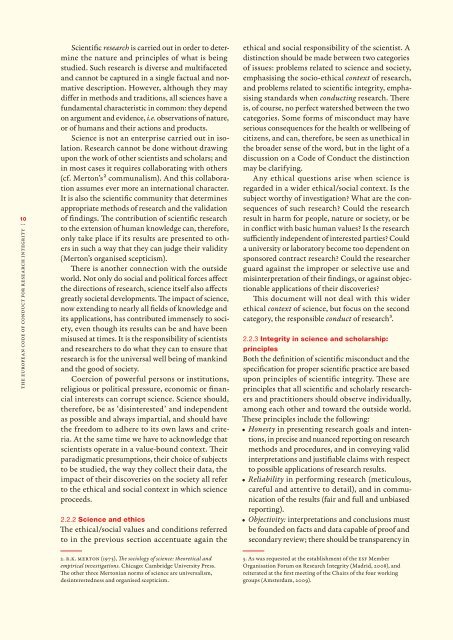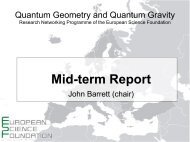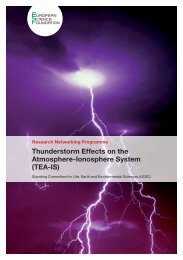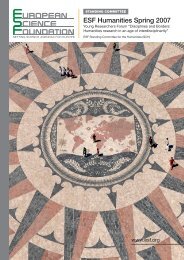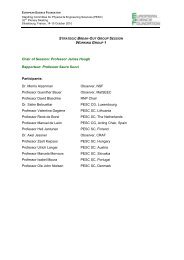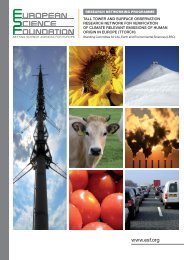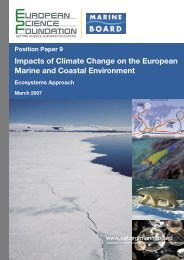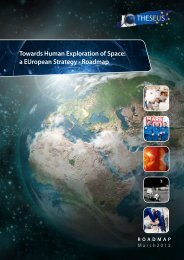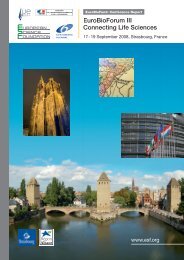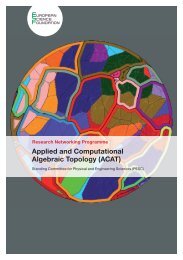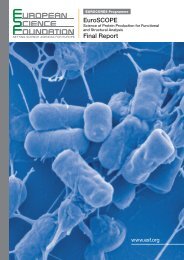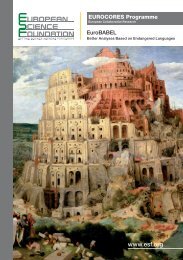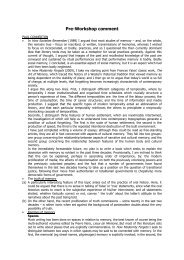The European Code of Conduct for Research Integrity
The European Code of Conduct for Research Integrity
The European Code of Conduct for Research Integrity
- No tags were found...
Create successful ePaper yourself
Turn your PDF publications into a flip-book with our unique Google optimized e-Paper software.
10<strong>The</strong> <strong>European</strong> <strong>Code</strong> <strong>of</strong> <strong>Conduct</strong> <strong>for</strong> <strong>Research</strong> <strong>Integrity</strong>Scientific research is carried out in order to determinethe nature and principles <strong>of</strong> what is beingstudied. Such research is diverse and multifacetedand cannot be captured in a single factual and normativedescription. However, although they maydiffer in methods and traditions, all sciences have afundamental characteristic in common: they dependon argument and evidence, i.e. observations <strong>of</strong> nature,or <strong>of</strong> humans and their actions and products.Science is not an enterprise carried out in isolation.<strong>Research</strong> cannot be done without drawingupon the work <strong>of</strong> other scientists and scholars; andin most cases it requires collaborating with others(cf. Merton’s2 communalism). And this collaborationassumes ever more an international character.It is also the scientific community that determinesappropriate methods <strong>of</strong> research and the validation<strong>of</strong> findings. <strong>The</strong> contribution <strong>of</strong> scientific researchto the extension <strong>of</strong> human knowledge can, there<strong>for</strong>e,only take place if its results are presented to othersin such a way that they can judge their validity(Merton’s organised scepticism).<strong>The</strong>re is another connection with the outsideworld. Not only do social and political <strong>for</strong>ces affectthe directions <strong>of</strong> research, science itself also affectsgreatly societal developments. <strong>The</strong> impact <strong>of</strong> science,now extending to nearly all fields <strong>of</strong> knowledge andits applications, has contributed immensely to society,even though its results can be and have beenmisused at times. It is the responsibility <strong>of</strong> scientistsand researchers to do what they can to ensure thatresearch is <strong>for</strong> the universal well being <strong>of</strong> mankindand the good <strong>of</strong> society.Coercion <strong>of</strong> powerful persons or institutions,religious or political pressure, economic or financialinterests can corrupt science. Science should,there<strong>for</strong>e, be as ‘disinterested’ and independentas possible and always impartial, and should havethe freedom to adhere to its own laws and criteria.At the same time we have to acknowledge thatscientists operate in a value-bound context. <strong>The</strong>irparadigmatic presumptions, their choice <strong>of</strong> subjectsto be studied, the way they collect their data, theimpact <strong>of</strong> their discoveries on the society all referto the ethical and social context in which scienceproceeds.2.2.2 Science and ethics<strong>The</strong> ethical/social values and conditions referredto in the previous section accentuate again theethical and social responsibility <strong>of</strong> the scientist. Adistinction should be made between two categories<strong>of</strong> issues: problems related to science and society,emphasising the socio-ethical context <strong>of</strong> research,and problems related to scientific integrity, emphasisingstandards when conducting research. <strong>The</strong>reis, <strong>of</strong> course, no perfect watershed between the twocategories. Some <strong>for</strong>ms <strong>of</strong> misconduct may haveserious consequences <strong>for</strong> the health or wellbeing <strong>of</strong>citizens, and can, there<strong>for</strong>e, be seen as unethical inthe broader sense <strong>of</strong> the word, but in the light <strong>of</strong> adiscussion on a <strong>Code</strong> <strong>of</strong> <strong>Conduct</strong> the distinctionmay be clarifying.Any ethical questions arise when science isregarded in a wider ethical/social context. Is thesubject worthy <strong>of</strong> investigation? What are the consequences<strong>of</strong> such research? Could the researchresult in harm <strong>for</strong> people, nature or society, or bein conflict with basic human values? Is the researchsufficiently independent <strong>of</strong> interested parties? Coulda university or laboratory become too dependent onsponsored contract research? Could the researcherguard against the improper or selective use andmisinterpretation <strong>of</strong> their findings, or against objectionableapplications <strong>of</strong> their discoveries?This document will not deal with this widerethical context <strong>of</strong> science, but focus on the secondcategory, the responsible conduct <strong>of</strong> research3.2.2.3 <strong>Integrity</strong> in science and scholarship:principlesBoth the definition <strong>of</strong> scientific misconduct and thespecification <strong>for</strong> proper scientific practice are basedupon principles <strong>of</strong> scientific integrity. <strong>The</strong>se areprinciples that all scientific and scholarly researchersand practitioners should observe individually,among each other and toward the outside world.<strong>The</strong>se principles include the following:• Honesty in presenting research goals and intentions,in precise and nuanced reporting on researchmethods and procedures, and in conveying validinterpretations and justifiable claims with respectto possible applications <strong>of</strong> research results.• Reliability in per<strong>for</strong>ming research (meticulous,careful and attentive to detail), and in communication<strong>of</strong> the results (fair and full and unbiasedreporting).• Objectivity: interpretations and conclusions mustbe founded on facts and data capable <strong>of</strong> pro<strong>of</strong> andsecondary review; there should be transparency in2. R.K. Merton (1973), <strong>The</strong> sociology <strong>of</strong> science: theoretical andempirical investigations. Chicago: Cambridge University Press.<strong>The</strong> other three Mertonian norms <strong>of</strong> science are universalism,desinterestedness and organised scepticism.3. As was requested at the establishment <strong>of</strong> the ESF MemberOrganisation Forum on <strong>Research</strong> <strong>Integrity</strong> (Madrid, 2008), andreiterated at the first meeting <strong>of</strong> the Chairs <strong>of</strong> the four workinggroups (Amsterdam, 2009).


